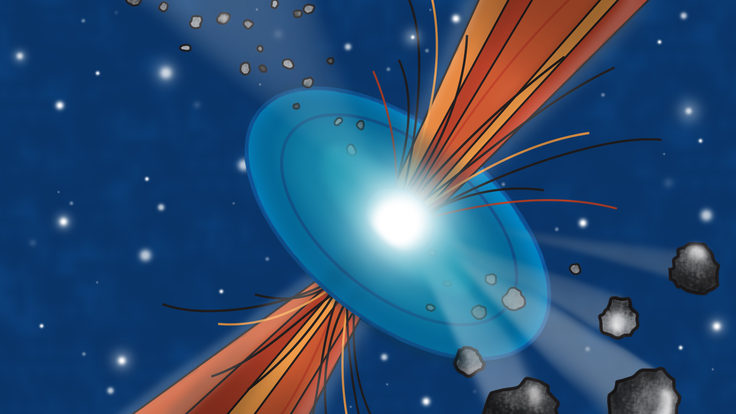Outweighing regular matter by a factor of five, but so far invisible to scientists’ experiments, dark matter is (literally) one of the biggest mysteries in our universe. A podcast from the Interactions Collaboration, Particle Mysteries, offers a new way to learn about the puzzling form of matter that holds our universe together, with a four-episode arc titled The Coldest Case.
The Coldest Case grew out of Dark Matter Day, a global initiative to engage the public in the worldwide search for this invisible substance. Blaire Flynn, a senior education and outreach officer at SNOLAB in Canada, is cochair of the Dark Matter Day committee. She pitched a podcast as an unexplored, relevant medium to tell the story of dark matter—as well as the stories of some of the people who are trying to find it.
Riding the wave of true-crime podcast popularity, Particle Mysteries treats dark matter like a suspect and its researchers like investigators trying to crack this unsolved case. Flynn co-hosts the podcast with Joseph Piergrossi, science writer and social media manager at DESY laboratory in Germany.
“Because [dark matter] is something that has such a difficult nature to it, we thought it was really almost inviting us to go with a detective story route,” Piergrossi says.
He says he hopes this approach will allow anyone to learn about dark matter. “We’re trying to make [the podcast] so that someone who doesn’t have a background in physics can follow along, understand it, and get involved.”
The first episode of Particle Mysteries was released the day before Dark Matter Day, which is celebrated on and around Halloween, an homage to dark matter’s almost ghost-like behavior. But Flynn and Piergrossi hope the podcast will be a platform where they can continue conversations about dark-matter research throughout the year.
Through time and space
The inaugural episode of Particle Mysteries introduces listeners to dark matter with a history lesson, explaining the astronomical observations that initially tipped physicists off to its existence in 1933. Today, researchers are still trying to directly detect dark matter for the first time.
“That’s the interesting part about science,” Piergrossi says. “There are questions that really last through generations.”
The question of dark matter also crosses international borders. The big experiments that are searching for it all over the world push the bounds of technology, requiring many researchers to work together on their development.
“Dark matter research is a collaborative global effort that cuts across cultures and countries,” Flynn says. “We really wanted this podcast to reflect that global collaboration.”
As such, Particle Mysteries: The Coldest Case is an international affair. Flynn and Piergrossi, who live in Canada and Germany respectively, interviewed researchers working on dark matter all over the world. The first episode includes snippets of audio from scientists in Italy, Germany and the United States.
The diverse set of 20 voices featured in the series are also at different stages in their career, ranging from students to more-seasoned researchers. Flynn and Piergrossi identified their interviewees via the Interactions Collaboration, which manages Dark Matter Day events and is made up of communicators from particle physics labs around the world.
A personal touch
The second episode of The Coldest Case dropped in January. It delves into the theory behind why researchers believe dark matter is some kind of particle and discusses the different kinds of experiments searching for these particles in space, on Earth, and underground.
Before making this podcast, Flynn was most familiar with underground direct detection because SNOLAB is home to this type of experiment. Piergrossi’s institution, DESY, on the other hand, is home to an experiment that is actively trying to create dark matter. “For me, it was really interesting and exciting to learn about different types of experiments that are happening elsewhere,” Flynn says.
A podcast, which is conversational by nature, also offers a space for researchers to talk about their own relationships with the dark matter mystery. “I think the opportunity to ask people questions both about their work and about themselves has been really fun and refreshing,” says Flynn, who, like many of her interviewees, was initially drawn to the exciting puzzle aspect of dark matter. “Those personal stories can make topics like dark matter more relatable.”
While the third episode of the podcast, which is scheduled to drop soon, will further develop the lineup of candidate dark-matter particles, the fourth and final episode will dig deeper into the conversations Flynn and Piergrossi have had with scientists about how they got into this field and where it’s going.
“It feels like we're getting really close, in terms of the size and scale of these experiments, to be able to answer this big question,” Flynn says, “and when we understand more about that huge portion of our universe, there will be so many possibilities of where that research could then go and how it can impact our lives here on Earth.”
If there are especially exciting new developments, Particle Mysteries may release additional episodes to The Coldest Case series. In the meantime, Flynn and Piergrossi hope to expand the podcast by exploring the cases of other mysterious particles.
Editor’s note: Chiara Villanueva contributed to this article.








